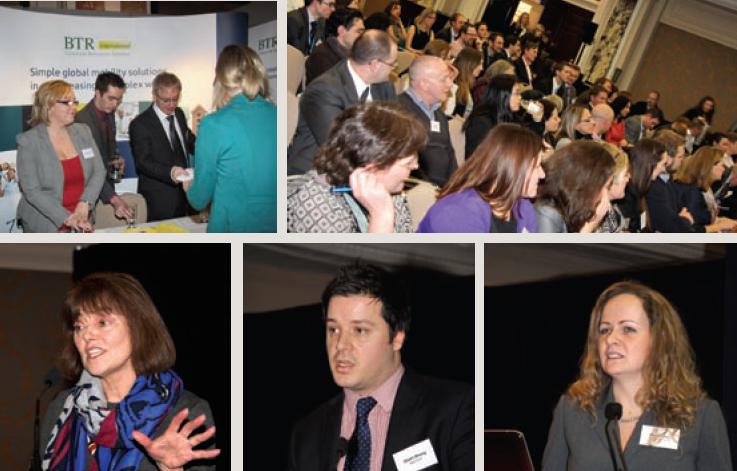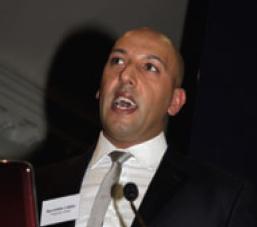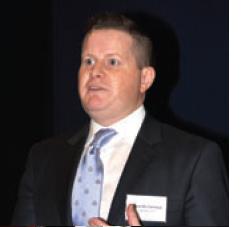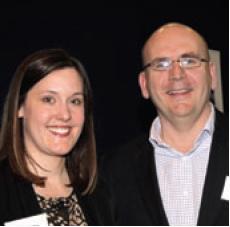It was on the 3rd February that the famous Russell Hotel in London’s Bloomsbury played host to the 2014 Corporate Relocation Conference and Exhibition. Steve Jordan went along to find out what’s hot in the relo world.

It’s always a treat to step into the palatial surroundings of The Russell Hotel. There’s just something about the comfortable leather chairs and marble columns in the foyer that transport you to a past world. A world where things happened slower, where ladies and gentlemen behaved as such (at least in public) and international relocation was unknown. But on that chilly February morning the leaders of the world of relocation gathered for one of the main events of the year: the Corporate Relocation Conference and Exhibition organised by Helen Elliott, editor of International HR Adviser and American in Britain.
As usual the exhibition was well supported by 30 stands promoting a wide range of services including: healthcare for employees; immigration services; pet shipping; luxury accommodation in Park Lane; international schools; lawyers; accountants; recruitment; and moving services. But for many it was the extensive programme of business presentations that took place through the day that was the real attraction hosted, ably and professionally of course, by Tad Zurlinden of EuRA.
Mary Langford from the Langford International Education Consultancy kicked off proceedings by discussing third-culture kids and the revelation that over half of Britain’s 18-24-year olds wished that they had worked or studied abroad at some time. His presentation addressed some of the challenges and benefits for a child living abroad and how professionals can help them make the most out of the experience.

Geraldine Mc Kendrick, a Focus Careers Consultant spoke about making dual careers possible. She said that households in which both partners have careers are becoming the norm. This is a problem for many companies with 66% saying that concerns about a partners’ career is a key reason for potential assignees turning down expatriate roles. Many companies are, therefore, taking care to help partners find appropriate work or provide support, especially cultural, during the settling-in period. Many expatriates do not know that this service is available so it’s up to their employers to get the message across.
Stuart Strong from BDO explained the differences in US and UK tax for the benefit of US expatriates working in the UK. He spoke about the UK residency test, tax free allowances, and tax equalisation. His colleague, Scott Wickham, explained the options for filing US tax returns including considerations such as taxation of share options, medical cover, inheritance tax, etc. and provided scenarios to clearly explain US tax filing obligations.
Nora Mulhari from Ferguson, Snell & Associates again looked west by focussing on the various types of visas that were available for individuals wishing to work in the USA. The requirements vary dramatically depending on the person’s circumstances such as: if they are working on contract and paid from the UK, how long they have been working in the USA, or if they are employed by a US company. She explained that it was very important to find the correct visa category.

Garvinder Lidder also from Ferguson, Snell & Associates gave a UK immigration update. He explained that there have been many changes over that last 12 months including the requirement to sit an English language test for listening and speaking ability. He also offered advice on managing global immigration including managing projects, compliance, reputational requirements and the emotional needs of the individual.
Scott McCormick and Robin Brown from Deloitte LLP talked about using data analysis to help companies make better decisions. They explained how it was possible to build a business case to invest in analytics, harnessing data and using it to drive the mobility requirements of a business. This information might include, for example, programme spend by country, gender or housing and the relevant trends that apply. The intention was to provide foresight into ROI, predict who is likely to stay on after an assignment, track talent through an organisation, and help to plan resources.
James Holder and Emma Gibbs from Expat Academy Ltd closed the business element of the conference with a look at connectivity in the world of mobility. This interactive session looked at how more HR functions are being outsourced, to relocation companies for example, and how the global mobility industry needs to become more strategic, collaborate and work smarter to ensure long-term success in the future.
The business sessions are detailed and somewhat arcane for members of the moving industry that traditionally only operate on the fringes of the global mobility world. However for those companies that are close to the relocation scene it provided vital information to help them stay in touch with latest developments and keep one step ahead of the rest.
Photos: Top - Delegates at the conference and exhibition, Geraldine McKendrick, Stuart Strong, Nora Mulhari. Individual photos top to bottom: Garvinder Lidder, Scott McCormick, Emma Gibbs and James Holder.
Click here to view the next Editor's pick